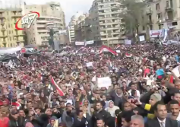
Egypt (MNN) – Egypt is in chaos. The interim government declared a state of emergency as battles between protesting Egyptians and police erupted in Cairo, Alexandria, Aswan and in smaller towns and villages.
The headlines are touting a forcible end to protests. Death tolls are noted. The injured are showing up in droves at field hospitals.
This time, though, instead of Christians, the protesters are members and sympathizers of the Muslim Brotherhood. They are angry at the forcible removal of President Mohamed Morsi last month.
The ones doing the cleanup: the new military government. The situation harkens back to the pre-Morsi regime in flavor. George Makeen is a program director for SAT-7, a Christian satellite television ministry to the Middle East and North Africa. He agrees. “This reflects on Mubarak. Mubarak himself was a military general. Some people might think that with military forces interfering in political life , we’re getting back the old regime. This counteracts the Revolution that started two years ago.”
What’s more, says Makeen, the threat of destabilization threatens to undo any forward progress Egypt has made in the days since the Arab Spring. “The removal of president Morsi was the request of millions of people who clearly were in the streets and asked for him to be removed. Yet, these concerns are valid and if people are not careful, or if they don’t stick to principles, the military can take over and we can get back to ground zero.”
It’s clear this isn’t going to simmer down or go away any time soon. The sitting Constitution was hastily passed by Islamists and creates the potential for dictatorship. “Anybody at any time can come to you and say that your freedom of speech is contradicting the morals of this site and so I will shut you up. Or, being religiously free is contradicting the morals of this site, so I will shut you up.”
Meanwhile, violence by the Muslim Brotherhood against Christians has been steadily on the rise. Islamist ire brings another question into play: if they get angry enough, could the Muslim Brotherhood turn into an insurgency? Makeen says, “Islamists now are doing this terrible act of ‘if we are politically frustrated, we can turn the whole country into fire. Who is the weakest that we can start with? Christians.’ so they started to attack Christians in Upper Egypt, burning churches and threatening that there would be no Christians anymore.”
There’s a month-old petition on the White House website asks the administration to declare the Muslim Brotherhood a terrorist organization. The request quickly garnered more than the 100,000 signature requirement for the Obama administration to officially consider the request.
With the word ‘insurgent’, the specter of al Shabab (Somalia), the Tuareg (Central African Republic), Boko Haram (Nigeria) and al Qaeda (Iraq) comes to mind.
That’s when the real anxiety about instability begins. Violence tends to beget violence. SAT-7’s programming provides a forum for the marketplace of ideas. They find ways to shift the focus of their content to address the issues without taking sides. Really, the program presenters nearly always find ways to encourage people toward truth in Scripture.
(Image courtesy SAT7)
Regardless of the region, be it Syria, Iraq, Palestine or Egypt, SAT-7 tries to encourage the war-weary. Makeen says the message is tailored to believers because, “They need to share Him with what is happening, to take a Word from Him and then move out to spread this Word to be the light and salt in this troubled world that really needs to hear something different, something positive in all the sadness and darkness we see around us.”
That’s not to say that security doesn’t weigh heavily on their minds in times of uncertainty. For the SAT-7 staff in Cairo, the tension is palpable. Staff members are directly impacted. “Some of them are afraid to move out. They don’t know how fast the situation will develop. The headquarters of the Muslim Brotherhood is just a few meters away from our office in Cairo.”
Makeen asks if you would you pray with them. “We need balance and we need God to give us wisdom in how to support different groups in that huge, troubled region. The other thing is praying for the safety of people.”

 08-15-13.jpg)